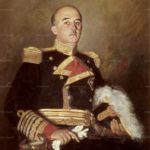 The Spanish Republic was supported by a revolutionary ideology heading towards communism, and during that revolutionary phase the Catholic Church suffered great persecution by the Republic. This prompted the Vatican to make the first timid attempts to break the isolation to which Franco’s Spain had been subjected in the post-war period at the same time as the beginning of the Cold War, when the Soviet Union began to be perceived as the new enemy of the United States. But that was until 1953 because the Falange was anti-clerical, and the Vatican wanted nothing to do with anything that smacked of fascism. Only with Spain’s rapprochement with the United States could we say that Franco had won the war, as his country was thus able to emerge from the isolationist purgatory to which Spain had been subjected in the immediate post-war years.
The Spanish Republic was supported by a revolutionary ideology heading towards communism, and during that revolutionary phase the Catholic Church suffered great persecution by the Republic. This prompted the Vatican to make the first timid attempts to break the isolation to which Franco’s Spain had been subjected in the post-war period at the same time as the beginning of the Cold War, when the Soviet Union began to be perceived as the new enemy of the United States. But that was until 1953 because the Falange was anti-clerical, and the Vatican wanted nothing to do with anything that smacked of fascism. Only with Spain’s rapprochement with the United States could we say that Franco had won the war, as his country was thus able to emerge from the isolationist purgatory to which Spain had been subjected in the immediate post-war years.
The consolidation of Francoist Spain in the 1950s must be seen in this light: Franco was never an original ideologue. He never wrote a Mein Kampf. He was first and foremost a soldier, and wanted to organise Spain as if it were military barracks. That is why when he died there was no more Francoism. (Compare it with National Socialism. Despite all the propaganda bullshit that the White traitors and the Jews have been throwing at it, the National Socialist idea still lives on in the hearts of dissidents.)
The degeneration of Spain after the death of the caudillo wouldn’t have happened if the Falange, the single party, had been able to re-educate the young Spaniards with its fascist ideology. But in the late 1950s the Falange lost the internal struggle and the technocrats of Opus Dei gained influence. If Franco had respected the 1956 Falange initiative on who would succeed him after his death, instead of passing the mantle to Prince Juan Carlos, Spain wouldn’t have deteriorated so rapidly after 1975.
Franco’s decision to appoint Juan Carlos as his successor came as a bucket of cold water to the Falangists in 1969. But the real war had already been lost since 1945. Without the world Hitler and Mussolini dreamed of, young Spaniards were beginning to Americanise and Sovietise even while the Generalissimo was still alive. By the end of the 1960s, a university survey showed that more than 70 per cent of students were influenced by philo-Marxist or Christian democratic values, and only 10 per cent embraced the ideals of Francoism. These young people knew nothing of the trauma of the civil war. The American and Western European lifestyle had already seduced them through the great tourism that Spain enjoyed, as well as the degenerate music that tourists brought with them, such as rock music, not to mention the sexual liberation of the late 1960s.
Once crowned, Juan Carlos I of Spain handed over power to parliamentary democracy instead of exercising it as king. He is remembered for this role during the Spanish transition. A 1981 coup attempt failed and Juan Carlos supported the European Union and NATO (the aim of the failed coup was to bring back a Francoist regime in Spain by a group of civil guards). Juan Carlos must be remembered as one of those responsible for the implementation of the immigration laws that opened Spain’s borders to mass immigration. He can be considered an accomplice to the genocide of Iberian whites in Spain.
As in the rest of the western world, in the end the bad guys in our film prevailed. The moral of this story is that only the implementation of National Socialism, in all its purity, could save the Aryan: something the racial right in America is in no way trying to do, at least in an academic way at the moment (as I do in The West’s Darkest Hour).